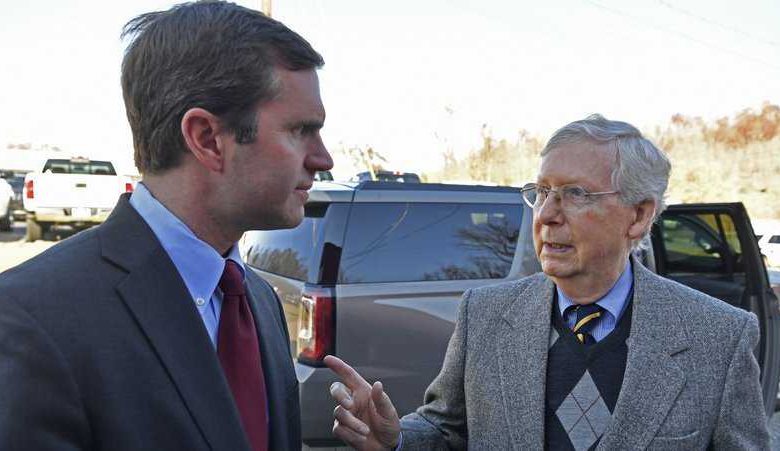

Mitch McConnell has given his blessing to legislation to change how a vacant U.S. Senate seat would be filled in his home state of Kentucky, but it most certainly doesn’t signal an opening is contemplated, an ally of the Senate Republican leader said Friday.The bill was advanced by a Kentucky House committee, leaving it one step away from clearing the GOP-dominated legislature. The measure would remove the Democratic governor’s ability to make his own choice if a Senate seat opened up. Republicans hold both Senate seats from Kentucky and wield supermajorities in both legislative chambers, giving them the votes to override any veto. Kentucky Senate President Robert Stivers, the bill’s lead sponsor, acknowledged Friday that the bill had sparked questions about the 79-year-old McConnell, who won reelection last year.“Let me make this definitive statement: He is not sick, he is not leaving -- maybe to some people’s chagrin -- but he plans to be there,” Stivers told the committee.Stivers, the state Senate’s top leader, acknowledged that he discussed the bill ahead of time with McConnell, but neither has indicated who suggested the legislation.“I asked him about this and said, ‘If I file this, people will question why am I filing this?’ Has nothing to do with anybody potentially leaving,” Stivers said during the committee discussion.McConnell, who previously endorsed the bill, said it would improve how a vacancy would be filled.“It would also ensure Kentucky voters have the ability to choose who they think will best represent them in a timely manner, as opposed to leaving that decision to the governor, regardless of party,” McConnell said in a statement Friday.When asked about the succession bill, Sen. Rand Paul’s spokeswoman Kelsey Cooper said Friday that Kentucky’s junior senator “fully intends to serve out the remainder of this term and the next one, too.” Paul is up for reelection in 2022.The legislation reflects the GOP’s commanding position in attempting to reset terms for senatorial succession if a vacancy occurred in the Bluegrass State.Any vacancy in the evenly split U.S. Senate would be of enormous consequence. Democrats have the slim edge in the 50-50 chamber because Vice President Kamala Harris is a tie-breaking vote. The Kentucky bill would put strict conditions on Democratic Gov. Andy Beshear in picking a temporary replacement if a vacancy occurred. The governor would have to choose from a three-name list provided by party leaders from the same party as the senator who formerly held the seat. With McConnell and Paul holding the seats, that means GOP leaders would submit the names.Stivers said the process would reflect the will of the state’s electorate.“The people elected a Republican to be their representative in the United States Senate,” he said.Kentucky law currently allows the governor to appoint someone to fill the seat until the next regular election of the U.S. House of Representatives — every two years.The bill would set up a process for a special election to fill the remainder of the unexpired Senate term. If the vacancy occurred more than three months before a regular election, any candidate able to collect enough signatures would compete in the special election, regardless of party affiliation. If no one received a majority of votes, a runoff would occur between the top two vote-getters.Beshear has criticized the bill, saying the process to fill a vacancy “shouldn’t be decided based on who’s currently in the office.” But Stivers says he would have supported putting the same constraints on the state’s previous governor, Republican Matt Bevin.“I’m not so sure I’d want the former governor having unfettered discretion to pick the replacement,” the Senate president said.___The legislation is Senate Bill 228.
Mitch McConnell has given his blessing to legislation to change how a vacant U.S. Senate seat would be filled in his home state of Kentucky, but it most certainly doesn’t signal an opening is contemplated, an ally of the Senate Republican leader said Friday.
The bill was advanced by a Kentucky House committee, leaving it one step away from clearing the GOP-dominated legislature. The measure would remove the Democratic governor’s ability to make his own choice if a Senate seat opened up. Republicans hold both Senate seats from Kentucky and wield supermajorities in both legislative chambers, giving them the votes to override any veto.
Kentucky Senate President Robert Stivers, the bill’s lead sponsor, acknowledged Friday that the bill had sparked questions about the 79-year-old McConnell, who won reelection last year.
“Let me make this definitive statement: He is not sick, he is not leaving -- maybe to some people’s chagrin -- but he plans to be there,” Stivers told the committee.
Stivers, the state Senate’s top leader, acknowledged that he discussed the bill ahead of time with McConnell, but neither has indicated who suggested the legislation.
“I asked him about this and said, ‘If I file this, people will question why am I filing this?’ Has nothing to do with anybody potentially leaving,” Stivers said during the committee discussion.
McConnell, who previously endorsed the bill, said it would improve how a vacancy would be filled.
“It would also ensure Kentucky voters have the ability to choose who they think will best represent them in a timely manner, as opposed to leaving that decision to the governor, regardless of party,” McConnell said in a statement Friday.
When asked about the succession bill, Sen. Rand Paul’s spokeswoman Kelsey Cooper said Friday that Kentucky’s junior senator “fully intends to serve out the remainder of this term and the next one, too.” Paul is up for reelection in 2022.
The legislation reflects the GOP’s commanding position in attempting to reset terms for senatorial succession if a vacancy occurred in the Bluegrass State.
Any vacancy in the evenly split U.S. Senate would be of enormous consequence. Democrats have the slim edge in the 50-50 chamber because Vice President Kamala Harris is a tie-breaking vote.
The Kentucky bill would put strict conditions on Democratic Gov. Andy Beshear in picking a temporary replacement if a vacancy occurred. The governor would have to choose from a three-name list provided by party leaders from the same party as the senator who formerly held the seat. With McConnell and Paul holding the seats, that means GOP leaders would submit the names.
Stivers said the process would reflect the will of the state’s electorate.
“The people elected a Republican to be their representative in the United States Senate,” he said.
Kentucky law currently allows the governor to appoint someone to fill the seat until the next regular election of the U.S. House of Representatives — every two years.
The bill would set up a process for a special election to fill the remainder of the unexpired Senate term. If the vacancy occurred more than three months before a regular election, any candidate able to collect enough signatures would compete in the special election, regardless of party affiliation. If no one received a majority of votes, a runoff would occur between the top two vote-getters.
Beshear has criticized the bill, saying the process to fill a vacancy “shouldn’t be decided based on who’s currently in the office.” But Stivers says he would have supported putting the same constraints on the state’s previous governor, Republican Matt Bevin.
“I’m not so sure I’d want the former governor having unfettered discretion to pick the replacement,” the Senate president said.
___
The legislation is Senate Bill 228.
Source link








